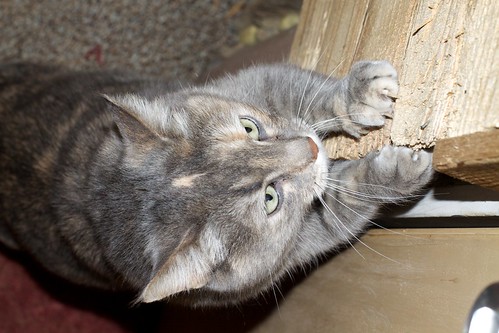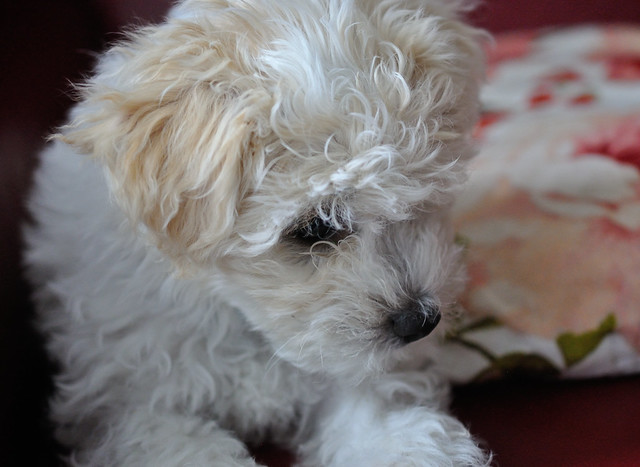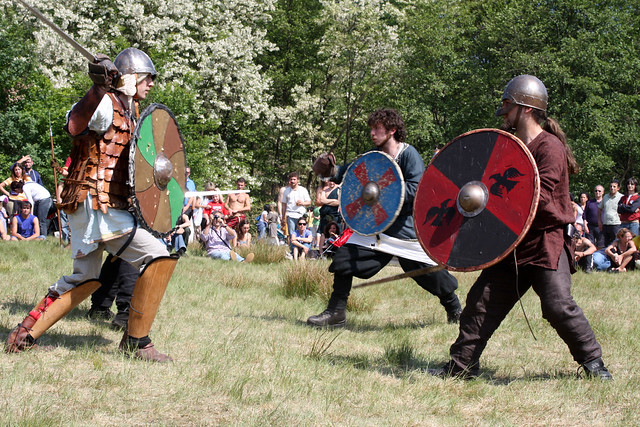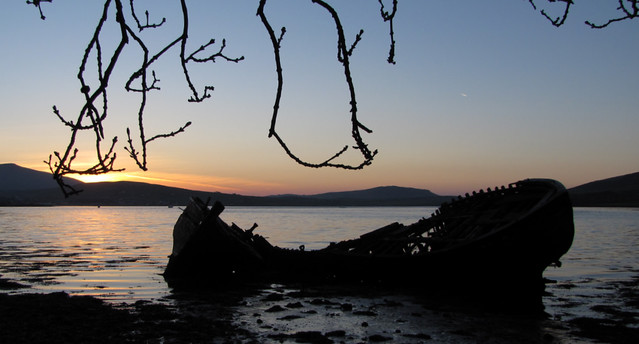Words for baskets and related things in Celtic languages.

| Proto-Celtic |
*kleibo = (?) |
| Old Irish (Goídelc) |
clíab = basket, breast, chest, ribcage |
| Middle Irish (Gaoidhealg) |
clíab = basket, skep, bee-hive, coracle, currach, breast, bosom
cliabach = slender-bodied
cliabaire = infant
cliabán = cradle, bird-trip, bird-cage |
| Irish (Gaeilge) |
cliabh [klʲiəvˠ/klʲiəw] = ribbed frame; body, chest, bosom; creel, pannier basket
cliabhadóir = creel-maker
cliabhadóireacht = creel-making
cliabhaire = basket-carrier, travelling poultry-dealer
cliabhán = cradle, wicker cage
cliabhrach = bodily frame, chest, thorax; (person of) large frame |
| Scottish Gaelic (Gàidhlig) |
cliabh [kliəv] = basket, creel, pannier, ribcage, straightjacket
cliabhadh [kliəvəɣ] = (act of) putting into a creel
cliabhan = small creel, small hamper, wreckage, broken timbers
cliabhadair, cliabhair [kliəvədɪrʲ] = basket-maker |
| Manx (Gaelg) |
clean = pannier, potato creel, twig basket; cot, cradle |
| Middle Welsh (Kymraec) |
kauell, cawell = basket, pannier, cradle
cawelleit = basketful, hamperful, quiverful |
| Welsh (Cymraeg) |
cawell = basket, pannier; cradle; fish-trap, creel, cage; quiver; belly, breast
cawellaf, cawellu = to put into a hamper or basket; cradle
cawellaid = basketful, hamperful, quiverful
cawellig = little basket
cawellwr = basket-maker, maker of wicker fish-traps |
| Middle Cornish (Cernewec) |
cawal, cauwal, cowal = hamper, basket, pannier
cawel gwanan beehive |
| Cornish (Kernewek) |
kowel = hamper, basket, cage
kowel gwenen beehive
kowel-gwari = playpen
kowella = to cage |
| Old Breton |
cauell, cauèl, queuel, qavell = cradle, trap, locker |
| Middle Breton (Brezonec) |
kavell, kavel, kevell, cauell = cradle, trap, locker
kavell-bez = tomb
kavellad = contents of a trap
kavellañ = to put in a basket |
| Breton (Brezhoneg) |
kavell = cradle, trap, locker
kavell-bez = tomb |
Etymology: from the Proto-Indo-European *ḱley- (to lean) [source]. Celtic words for fence, hurdle, lattice and related things come from the same root: more details, as do words for left and related things.
Words from the same Proto-Celtic root, via Gaulish and Latin, include claie (wicker rack, trellis, hurdle) in French and cheda (wattled laterals at the base of a traditional cart) in Galician [source].
Words from the same PIE root include client, climate, clinic, incline and lean in English, leunen (to lean) in Dutch, lehnen (to lean) in German, chinàre (to bend) in Italian, and clemente (lenient) in Spanish [source].
| Old Irish (Goídelc) |
ces = basket |
| Middle Irish (Gaoidhealg) |
ces = basket, hamper, pannier, bee-hive, skep, causeway of hurdles |
| Irish (Gaeilge) |
cis [cɪʃ] = wicker container, basket, crate, plaited or crossed twigs as support for causeway
ciseach = wattled causeway, improved path, footbridge, over soft ground or drain, hamper
ciseachán = breadbasket, stomach
ciseán = (wicker) basket
ciseadóir = wicker-worker, basket-maker
ciseadóireacht = wicker-work, basketry
ciseog = shallow basket (for potatoes, etc)
cispheil = basketball |
| Scottish Gaelic (Gàidhlig) |
cis [kʲiʃ] = (large) woven/wicker basket, wickerwork panel, hurdle
ciseach [kʲiʃəx] = wickerwork path/bridge
ciseag, cisean, ciosan = small woven basket or creel, kishie
cisean [kliəvədɪrʲ] = basket-maker |
| Manx (Gaelg) |
kishan = skep
kishan pabyr = waste paper basket
kishan shellan = hive |
Etymology: from Old Norse kista (chest, box), from Latin cista (trunk, chest, casket), from Ancient Greek κίστη (kístē – box, chest, casket), from Proto-Indo-European *kisteh₂ (woven container) [source].
Words from the same roots include chest in English, kist (chest, box, trunk, coffer) in Scots, Kiste (box, crate, case, chest) in German, ciste (chest, coffer, treasure, fund) in French, cesta (basket, hamper) in Spanish [source].
| Irish (Gaeilge) |
bascaed = basket |
| Scottish Gaelic (Gàidhlig) |
basgaid [basgɪdʲ] = basket
basgaid-arain = breadbasket
basgaid-bidhe = hamper
basgaid-sgudail = wastebasket
ball-basgaid = basketball |
| Manx (Gaelg) |
basca(i)d, baskad, bastag = pannier, potato creel, twig basket; cot, cradle
bastag arran = breadbasket
bastageyr = basket maker |
| Middle Welsh (Kymraec) |
basged, bascet, basced = basket, basketful
basgedeit = basketful, hamperful |
| Welsh (Cymraeg) |
basgeg = basket, basketful
basgedaf, basgedu = to place in a basket, to make baskets
basged(i)aid = basketful, hamperful
basgedwaith = basketry, basketwork, wickerwork
basgedwr, basgedydd = basket-maker |
| Middle Cornish (Cernewec) |
basced = basket |
| Cornish (Kernewek) |
basket = basket |
Etymology: from Middle English basket, from Anglo-Norman bascat (basket), possibly from Late Latin bascauda (a woven mat or vessel to hold basketwork), from Proto-Celtic *baskis (bundle, load), from Proto-Indo-European *bʰask- (bundle), or non-Indo-European source.
Words from the same Proto-Celtic root include bâche (tarpaulin, canvas sheet, cover) in French, vascullo (broom, bundle of straw) in Galician, basket in English, فَشْقَار (fašqār – a heap of sheaves) in Arabic [source].
Other words from the PIE root *bʰask- include fascis (bundle, burden, load, high office) in Latin, and possibly bast (fibre made from certain plants used for matting and cord) in English, bast (bast, raffia) in Danish, bast (inner bark, velvet, skin, hide) in Dutch, and bashkë (together, simultaneously) in Albanian [source].
There are more details on the Burdensome Loads Celtiadur post, and the Celtic Pathways Baskets episode.
Words marked with a * are reconstructions.
Sources: Wiktionary, Am Faclair Beag, Online Manx Dictionary, Teanglann.ie, eDIL – Electronic Dictionary of the Irish Language, In Dúil Bélrai English – Old Irish glossary, Geiriadur Prifysgol Cymru, Gerlyver Kernewek, Gerlyvyr Cernewec, Dictionaire Favereau, TermOfis, Le dictionnaire diachronique du breton, Geriafurch, English – ProtoCeltic WordList (PDF), Etymological Dictionary Of Proto Celtic












